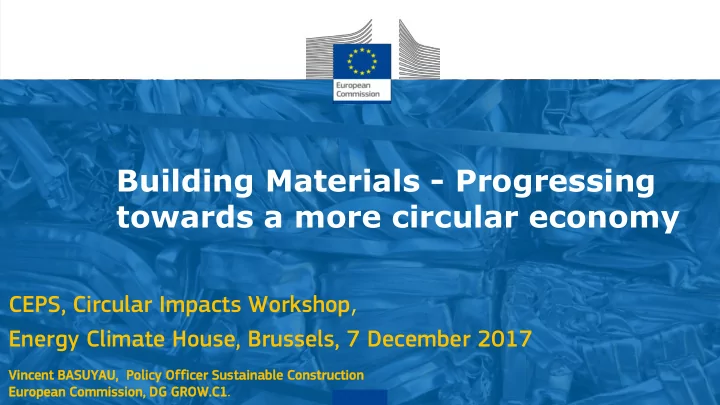

Building Materials - Progressing towards a more circular economy CEPS, Circular Impacts Workshop , Energy Climate House, Brussels, 7 December 2017 Vincent nt BASUYAU, AU, Poli licy Office icer Sustainab inable le Cons nstruc truction tion Europ opean an Commiss ission on, , DG GROW.C W.C1.
Links with European Union's Priorities Protecting the environment and maintaining our competitiveness have to go hand-in-hand: both are about a sustainable future 2
What is the Circular Economy? • Maintaining the value of products, materials and resources in the economy for as long as possible while minimising waste generation. • To boost our economy and competitiveness with new business opportunities and innovative products and services. • For economic, social and environmental gains 3
From a Linear Economy… 4
… to a Circular Economy 5
Objectives of the CE Package on 2 December 2015 Synergies between environment and business agendas • Preserve resources while creating business opportunities • Closer links to other key EU priorities: climate and energy jobs and growth, investment, innovation, social industrial competitiveness Propose concrete and ambitious action where EU intervention has high added value • long-term vision and targets on waste management • internal market rules for products • environment and consumers protection • regulatory obstacles or enforcement issues; innovation and investments 6
5 main areas of action Production Reparability, durability, and recyclability, resource efficiency, industrial symbiosis Consumption Reuse, availability of spare parts, Ecodesign, actions on false green claims, CE criteria in GPP., planned obsolescence assessment, EU Eco-label, Environmental Footprint Waste Revised legislative package on waste, Innovation, Investment management Cohesion Policy contributions guided by the EU & waste hierarchy. Monitoring Secondary Increase use of SRM, quality standards, interface chemicals, product, and waste raw materials legislation, knowledge of material stocks and flows. Innovation, € 650 million Horizon 2020 in the CE (2016- 17), € 1 billion (2018-20), Investment, financing CE with EIB and national Monitoring promotional banks. Monitoring framework to measure progress on reliable existing data. 7
Priority sectors Biomass & Plastics Bio-based Products Construction Food & Waste Demolition Critical Raw Materials 8
Construction & demolition Objective • Identify and increase recovery of valuable materials Key Actions: • Ensure recovery of valuable resources and adequate waste management in the construction and demolition sector • Develop pre-demolition guidelines to boost high-value recycling as well as voluntary recycling protocols aimed to improve quality of and build confidence. • Facilitate assessing the environmental performance of buildings 9
EU Construction and Demolition Waste Management Protocol • Increased demand for C&D recycled materials • New business activities • Increased cooperation along the value chain • Progress towards meeting C&D waste targets • Progress towards harmonised EU markets for C&D recycled materials • Generation of reliable C&D waste statistics Reduced environmental impacts and contribution to resource efficiency http://ec.europa.eu/growth/toolsdatabases/newsroom/cf/itemdetail.cfm?item_id=8985 10
Protocol translations & Presentations Roadshow in 6 capitals + events • Information: meeting national stakeholders and authorities • Networking: opportunities and enthusiasm for best practices • Reach: Press coverage in trade and business media Roadshow presentations: http://ec.europa.eu/growth/content/workshops-eu-construction-demolition-waste-management- protocol-6-eu-capitals_en Protocol translations: http://ec.europa.eu/DocsRoom/documents/20509/attachments/1/translations/ 11
Guidelines for Pre-demolition & renovation waste audits Development of Specific Tools and/or Guidelines for • a specific task within the project Assessment of Construction and Demolition Waste planning Streams prior to Demolition or Renovation of Buildings • the first step towards recycling and Infrastructures • fair competition amongst Original building documentation Desk study contractors Maintenance protocols • awareness and traceability Quality assurance Site visit Measurements, laboratory tests processes. Inventory Waste classification • assurance that contaminants are safely removed Management Legal and other requirements recommendations • better demolition waste Reporting Templates management 12
Level(s) EU approach to sustainable building performance reporting Tracking the levels of sustainability performance of buildings, taking into account the full life cycle. For different building professionals at different stages of a building project. Supports different levels of sustainability maturity, from beginners of assessment to LCA professionals. http://ec.europa.eu/environment/eussd/buildings.htm In progress Test phase Conference on 4 December 2017, Brussels 2019 Finalisation of the project 13
Looking forward • Foster investments in CDW recycling infrastructure in MS/regions lagging behind the target of 70% of recovery (WFD 2008/98/EC). Such investments could be supported by the Investment Plan for Europe. Workshop 16 November 2017 IDEA Consult 2017 14
Looking forward • Develop principles and rules for the Construction 2020 TG3 meeting 23 November 2017 design of buildings in order to generate less waste and facilitate recycling. • Increase the durability and recyclability of building components Building design improvements , durability, adaptability, reversibility. Design for Deconstruction (DfD), Design for Disassembly 15
Looking forward • Digital technologies to raise efficiency of construction processes BIM handbook http://www.eubim.eu/handbook/ • Address skills needs for the modernisation/digitalisation of the construction sector "Blueprints for Sectorial cooperation on skills". General Erasmus+ Call for Proposals 2018 published in the OJ on 25 October 2017. 16
Recommend
More recommend